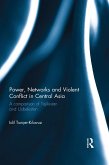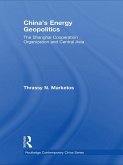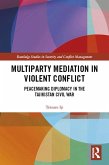When the five Central Asian republics gained independence from the Soviet Union in 1991, expectations of violent conflict were widespread. Indeed, the country of Tajikistan suffered a five-year civil war.The factors that the literature on civil wars cites as the causes of this war were also present in Uzbekistan - but this country had a peaceful transition. Examining this empirical puzzle by isolating the crucial factors that caused war to break out in Tajikistan but not Uzbekistan, this book applies a comparative approach to the broader question of why civil wars occur. It challenges many common explanations of civil war both generally and in Tajikistan in particular. This includes highlighting the importance of elites' power perceptions, which have their origins in the interaction of structural-, process-, and network-related variables.
Dieser Download kann aus rechtlichen Gründen nur mit Rechnungsadresse in A, B, BG, CY, CZ, D, DK, EW, E, FIN, F, GR, HR, H, IRL, I, LT, L, LR, M, NL, PL, P, R, S, SLO, SK ausgeliefert werden.









